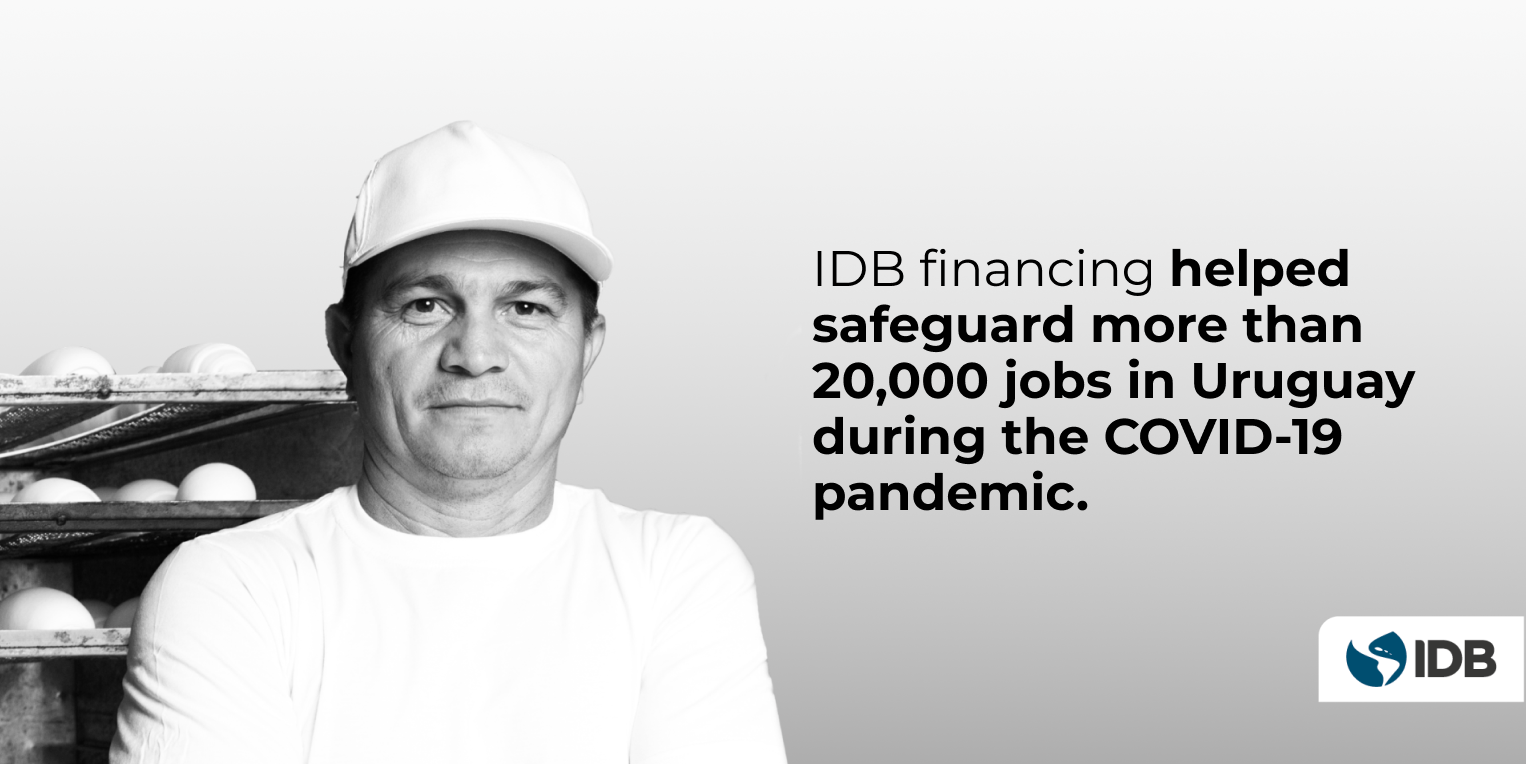When the COVID-19 pandemic struck in early 2020, Uruguay’s micro, small, and medium-sized enterprises (MSMEs) faced an existential crisis. Representing over 99% of private sector firms and employing more than two-thirds of the workforce, these businesses were hit hard by plummeting demand and mobility restrictions[1]. In response, the Inter-American Development Bank (IDB) partnered with the Uruguayan government to launch the Global Credit Program for Safeguarding the Productive Fabric and Employment (UR-L1171). This operation aimed to ease the constraints on access to credit faced by MSMEs affected by the COVID-19 crisis; support their survival and preserve the jobs they generated for the economy; minimize the burden on social protection systems; and maximize the speed of economic recovery once the health emergency was over.
As revenues dried up and operational costs continued, businesses were at risk of closing permanently. As a result of the pandemic, demand for guarantees was estimated at $337 million over the following 24 months, implying a credit mobilization of $487.5 million—80 percent of which was expected to be for working capital. The surge in demand for credit guarantees exceeded the capacity of Uruguay’s Guarantees for Business (Sistema Nacional de Garantías para Empresas – SiGa), requiring at least $96 million in additional funding to respond at a scale far beyond pre-pandemic levels (IDB 2020a). In response, the IDB provided an $80 million global credit loan to support the government of Uruguay in strengthening SiGa’s ability to meet excess demand under the SiGa emergency guarantee line and mobilize private lending to MSMEs.
With the proceeds from this instrument, it was estimated that up to $280 million could be provided in guarantees to mobilize up to $400 million in private credits—$120 million net of the guarantees—for MSMEs. The executing agency, Corporación Nacional para el Desarrollo, channeled the funds to eligible MSMEs through private financial intermediaries. The instrument’s goal was twofold: to support the short-term financial sustainability of enterprises facing liquidity shortages and to promote their longer-term recovery by ensuring access to working capital and investment finance. The program emphasized transparent eligibility, efficient disbursement, and strong monitoring—all tailored to meet the urgent needs of the sector while preserving institutional integrity.
According to the Project Completion Report, the intervention, structured through a global credit loan, achieved its objectives by mobilizing private finance, safeguarding jobs, and stabilizing Uruguay’s economy.
The SiGa guarantee portfolio grew from a pre-pandemic baseline of $45.6 million with an additional $30.2 million from the Uruguayan government (48.7 percent of total funding) and $80 million from the IDB’s global credit loan (51.3 percent), enabling $155.8 million in guarantees and mobilizing $370 million in MSME lending through private financial intermediaries. High demand and efficient implementation highlighted the program’s urgency and effectiveness. Between 2020 and 2022, the operation reached 10,146 MSMEs—far surpassing the original target of 2,000—with nearly 90 percent of credit lines supporting working capital such as payroll, utilities, and supplier payments. It also helped protect over 20,000 jobs, and more than one-third of beneficiaries were women-led businesses or businesses located in interior regions, promoting inclusive access to finance.
In addition to preserving MSME operations to survive the pandemic crisis, the private finance that was mobilized enabled many MSMEs to invest in adapting to new conditions, whether through digital tools, remote work setups, or process improvements. These private capital enabling effects contributed to laying the foundation for more sustainable, competitive business models. The intervention also demonstrated the importance of flexible and well-targeted financial responses in emergencies, offering valuable lessons on catalyzing private finance for future crisis preparedness. Furthermore, with technical assistance, the guarantee process was improved and automated, allowing financial intermediaries to receive confirmation within minutes and enabling faster credit access for MSMEs.
The Project Completion Report highlights the catalytic role of IDB instruments in sustaining development outcomes during external shocks. By rapidly deploying a credit guarantee mechanism through SiGa, the program mobilized private investment to support MSMEs at a critical moment, helping preserve employment and productive capacity. Its swift execution—within 90 days—along with improved credit terms and adaptive monitoring practices, underscored the importance of institutional readiness and flexible design in crisis response.
[1] Instituto Nacional de Estadística (INE). 2018. Directorio de Empresas y Establecimientos. Montevideo: INE, Uruguay


Leave a Reply